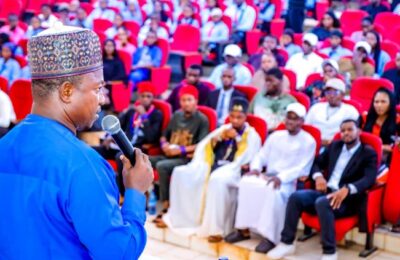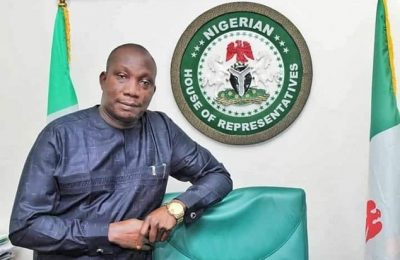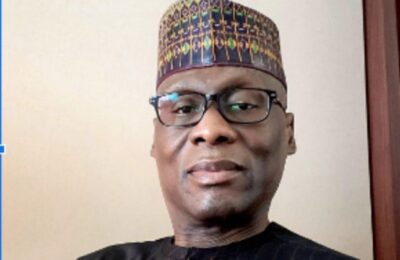A new dawn has come in the 21-year-old Middle Belt state of Kogi, as a group called People of the Confluence (POC) has decided to change the pattern electoral campaigns in the state.
According to Victor Walsh Oluwafemi, Executive Director in charge of Africa Operation at the African Development Studies Centre in Georgia, who spoke at a recent Press Conference in the ancient city of Lokoja (where the Union Jack was lowered for the last time in 1900), POC has gone far with arrangements to conduct Debates for all those who present themselves for leadership positions in the state, henceforth.
Arrangements he disclosed are going on for the staging of the first of such, tagged KOGI GOVENORSHIP DEBATE 2011, for all the candidates cleared to contest the December 2011gubernitorial elections. People of the Confluence, whose pay-off line is ‘Voice of Kogi Citizens in North America’, is driven by sons and daughters of the state doing business out there.
The Lokoja press briefing was described as “the first in a series of Press Conferences that would be geared towards addressing the development needs of Kogi,” the group who said they are using medium to “support our worthy course of raising the stake of political discourse in the state,” described themselves as “an amalgam of well-meaning sons and daughters of Kogi both at home and Diaspora,” which like many other groups, they emphasized, “genuinely believe that with good ideas and support of all stakeholders we can harness God given endowment within the state to make it the pride of the nation which it should have been all along.”
Kogi state has largely remained neglected, forgotten and little celebrated area, despite its great historic significance and the abundant human and material resources, the latter still largely underexploited.
As the citizens work for an improved Kogi by themselves, they expect their representatives at the National Assembly to use their position in the upper and lower houses to attract more Federal Presence to the area, and to move a motion for Kogi state to be recognized as the birthplace of modern Nigeria following which the Federal Government should be made to build a Park of international standard in honour of Flora Shaw and Mongo Park in Lokoja, Kogi State.
POC insists that contrary to the business-as-usual political organizations posing as non-partisan Civil Society Organizations, while fronting for political interests and groups, their association and its planned actions and activities are borne out of their love for the state and “have not received any funding from anybody, and do not intend to do so in future. Our goal is to set socio-economic and political development agenda for those who seek our mandate to govern us, irrespective of political leanings or affiliations.”
While commending the efforts of past and present leadership of the state for their pivotal role in making Kogi what it is today, acknowledging with a deep sense of responsibility the efforts made by successive regimes to bring development to the State in the face of limited state resources, People of the Confluence expressed their appreciation past leaders for what they described as “the atmosphere of relative political stability and the peaceful coexistence of the various ethnic groups.”
Observing however that as the old saying goes, “the largest room in this world is the room for improvement,” the stressed their desire to improve the lot of Kogi state people that forms the fulcrum of the interaction with the media an engagement they intend to sustain in the weeks and months ahead, to fast-track the achievement of their set goals, key among which is to make Kogi a new model in democratic governance in Nigeria and indeed in Africa.
Kogi really is unique for several reasons: both with regard to people and its geography. One of such unique features of the state which has been downplayed by the nation is the fact that Kogi is really the birthplace of our great nation, Nigeria. Those of us familiar with Nigerian History, The People of the Confluence remind us, know “the Niger Area is Kogi and that that, is where the nation derives its name from. It represents the hub upon which the will of the nation runs.” They add too, that the history of peaceful co-existence of Kogi people, without any known record of inter-tribal wars, will surely make the state centre of attraction to both tourists and investors.
Underscoring the great significance and timeliness of the press briefing and sustained engagement of the Media henceforth, the group said: “The state is transiting into another era (and) the sitting Governor by statutory mandate will soon hand over the baton of leadership to a successor. We warn through this medium to admonish whoever will succeed the Governor of Kogi State to brace up for the challenge of meeting and by far surpassing the achievement of this regime.”
With the elections in the area around the corner, all contenders to positions rearing to kick off electioneering campaigns to solicit votes, The People of the Confluence say they are using the platform to enjoin Kogi state and her people, “to take advantage of this golden opportunity to re-write our own history. We must make choices that will not mortgage our tomorrow and/or the future of our children.”
Development issues were raised at the media interactive, with the group whose motto is “Voice of Kogi citizens in North America,” urging the leaders to “move Kogi forward from where we are now” and underscoring the need to “set off with a strategic vision that would place Kogi on the global map of first class tourists’ destinations. The state must rank as one of the best globally, in physical infrastructures they declared,” and to achieve this desired state, they added, “we must eschew myopic political considerations, personalised power and corruption, capable of diminishing dividends of democracy and good governance; politicians must eschew ‘zero-sum’ political game and embrace ‘positive-sum’ politics.”
The activists explained what they meant further: Our politics must transcend working for the wellbeing of a select few to a politics which bring about the wellbeing of the greater majority, irrespective of their political leanings, social status or ethnic/religious background. For the efficacy and development of Kogi state, the government for the whole is indispensible.
In the next few years the association wants to see Theme Parks, Skyscrapers, Water Transportation within the region, Railways, spring up along the waterfront, construction activities in and around state, according to them, “these activities will be sufficient economic endeavours which can empower our people enough to pay taxes for sustainable development.”
Given their decision never to go cap in hand to anyone, reporters wanted to know how they would fund the development project. “Ideas rule the world,” quipped POC spokesperson Victor Walsh Oluwafemi, who added “I tell you it doesn’t require so much of fund, but ideas.”
On electioneering, which they intend to change fundamentally in these coming weeks in Kogi to set new standards for others, People of the Confluence say accountability is the most fundamental principle of good governance, assured through competitive elections in democratic societies, supporting their point with a Richard Joseph quote: “Free and fair elections are the bedrock of any democratic society and the most important means of making governments accountable to the citizenry”.
However, Oluwafemi rightly pointed out, over the years, elections in this part of the world have not performed this role. Rather, they serve only a ritual-like function, concealing the class domination of politics by the ruling elite. Thus, elections are not about who governs or propitious to political accountability, but only a symbolic exercise in a democracy.
The new dawn can only come if they say, “If our people demand good governance from those who lead or aspire to lead the rest of us. Good governance is measured by the extent to which a political regime can guarantee popular welfare and promote the greatest happiness of the greatest number of people in the society. If we must achieve this goal, our people must become wary of those who exploit our ethnic differences to further their political ambition. Let us look at it critically, confronted by this assertion that the Igala people have dominated the Kogi political landscape for too long, the question to ask is, how much more developed is Igala area than the Okun area for example?”
This new dawn in Kogi state will avoid, the activists say, whatever “agitates the community with ill-founded jealousies and false alarms, kindles the animosity of one part against another, and foments occasionally, riots and insurrections, as they open the door to external influence, ineptitude and corruption.”
The new way in Kogi state will be to “reject politicians” salt and pepper and demand what rightfully belong to them, be determined to vote wisely and ensure that our votes count, not to sell your conscience; and do not mortgage the future of our children on the altar of political expediency or momentary, pecuniary gains.
We will challenge all aspirants to a public debate, a platform that will enable us to asses their offer to Kogi people. We are not interested in vague political promises, but rather will want them to come up with measurable blueprints on how they intend to develop the state. Such blueprints should have implementation guidelines such that major milestones, so performance can be objectively assessed.”




